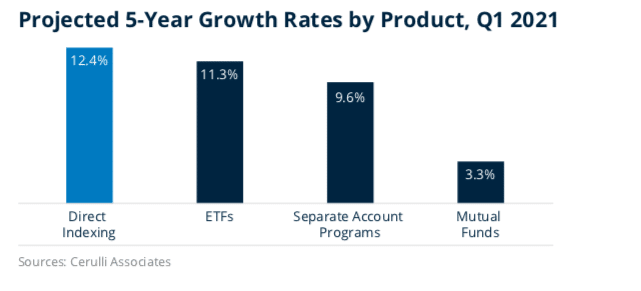Morningstar has acquired an index provider to provide more customized and personalized indexes as research provider Cerulli Associates has estimated that direct indexing will grow at an annualized rate of more than 12% over the next five years.
On September 8 Morningstar announced the acquisition of Moorgate Benchmarks, a privately held provider of index design, calculation, and administration.
Morningstar said combining Moorgate Benchmarks’ index design, calculation and administration technology and processes with its data, research, and index intellectual property will give investors more customized and personalized indexes, delivered faster.

Ron Bundy, president of Morningstar Indexes, said in a statement: “The index industry today needs disruption, with a number of entrenched players who aren’t providing enough value and innovation to investors for the fees they charge. Moorgate Benchmarks’ advanced technology, index calculation process, and strong reputation in Europe will help us address this issue head on.”
Cerulli report
Direct indexing allows investors to directly own all or a customized assortment of the individual securities in an index without purchasing a fund and is expected to grow at an annualized rate of more than 12% over the next five years. This is faster than traditional financial products such as mutual funds, exchange-traded funds and separate accounts, according to a report from Cerulli, sponsored by Parametric Portfolio Associates.
The report said that unlike mutual funds or ETFs, direct indexing provides individual portfolios with greater control to harvest gains and losses at the individual security level, while staying in risk and tracking error bands and allows tax optimization.
Tom O’Shea, director at Cerulli, said in the report: “Leading advisors view the tax optimization as a unique and tangible value they can deliver, but the solution offers additional customizations—responsible investing, flexible onboarding, and tax-optimized charitable giving—which can help advisors further differentiate their services.”
Direct indexing had $362bn in assets, nearly one-fifth of total retail separate account assets last year, according to the report as it is currently a niche product used by a small group of advisors for high net-worth clients.

Cerulli said: “Industry momentum is building and the market for the product is broadening—asset managers are acquiring direct indexing providers, introducing proprietary solutions to market, and applying direct indexing to new asset classes.”
ESG
Direct indexing also allows investors to match investments
to their personal values such as environmental, social and governance strategies or their faith.
“The ability to match investment portfolios with social values opens up applications for mission-driven institutions,” said the report. “Endowments, foundations, and other long-term investing pools can ensure that their investments reflect their mission and values.”
There has been recent renewed interest in direct indexing from asset managers with Morgan Stanley buying Eaton Vance, BlackRock acquiring Aperio and Vanguard purchasing Just Invest, which includes Kaleidoscope.
Tim Buckley, Vanguard chairman and chief executive, said in a statement: “Technology-driven solutions such as direct indexing continue to reshape our industry, driving better investment outcomes and lowering costs for clients. We are excited to welcome the Just Invest team and direct indexing capabilities to Vanguard to better serve our clients.”
“In addition, major wealth management platforms, such as Fidelity, Schwab, and Vanguard, began offering this service,” said the report. “Providers of direct indexing welcome the new competition as a positive for the industry as it would continue to raise awareness of the benefits.”
